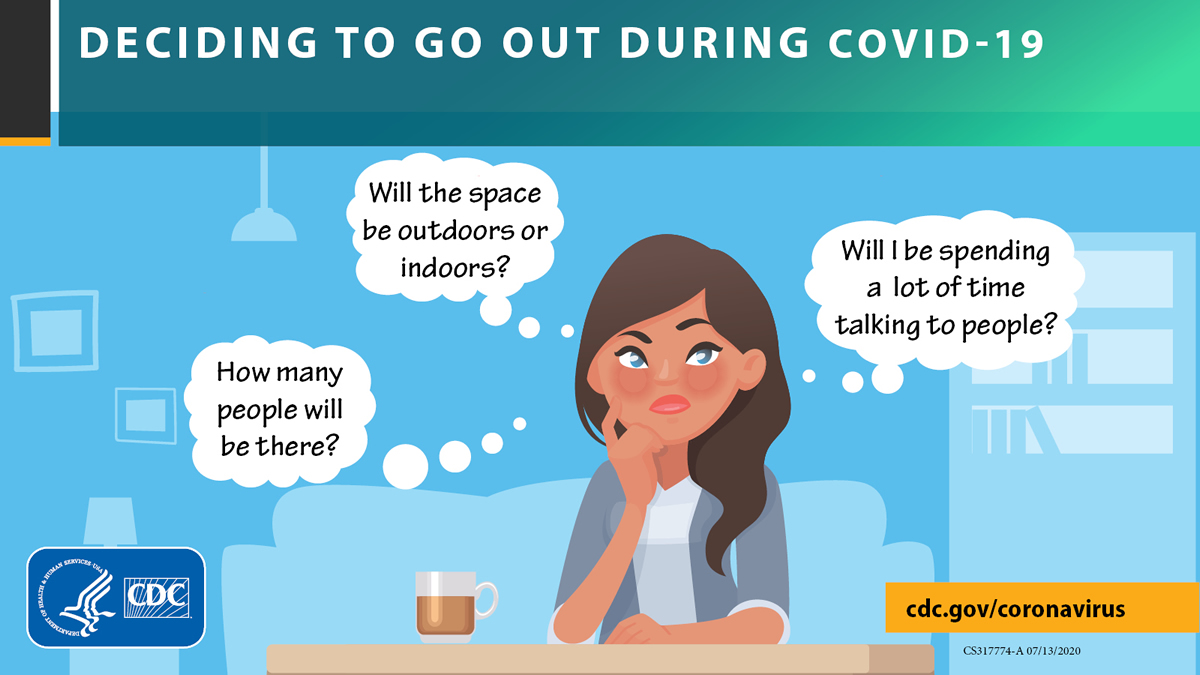Wondering how you can do your daily activities safely while protecting yourself and your loved ones from COVID-19?
The more closely you interact with others and the longer that interaction, the higher the risk of COVID-19 spread.
So, think about:
- How many people will be there?
- Will the space be indoors or outdoors?
- Will you spend a lot of time with others?
(“PST” here’s a hint – think People, Space, and Time.)

Learn more about assessing the risk when you‘re deciding to go out: https://www.cdc.gov/coronavirus/2019-ncov/daily-life-coping/deciding-to-go-out.html
- In general, the more closely you interact with others and the longer that interaction, the higher the risk of COVID-19 spread.
- If you decide to engage in public activities, continue to protect yourself by practicing everyday preventive actions.
- Keep these items on hand when venturing out: a mask, tissues, and a hand sanitizer with at least 60% alcohol, if possible.
Understand the potential risks of going out
As communities and businesses are opening, you may be looking for ways to resume some daily activities as safely as possible. While there is no way to ensure zero risk of infection, it is important to understand potential risks and how to adopt different types of prevention measures to protect yourself and to help reduce the spread of COVID-19.
The risk of an activity depends on many factors, such as:
- Is COVID-19 spreading in your community?
- Will you have a potential close contact with someone who is sick or anyone who is not wearing a mask (and may be asymptomatic)?
- Are you at increased risk of severe illness?
- Do you take everyday actions to protect yourself from COVID-19?
CDC cannot provide the specific risk level for every activity in every community. That’s why it’s important for you to consider your own personal situation and the risk for you, your family, and your community before venturing out.
Close contact with other people increases risk
In general, the more closely you interact with others and the longer that interaction, the higher the risk of COVID-19 spread. So, think about:
How many people will you interact with?
- Interacting with more people raises your risk.
- Being in a group with people who aren’t social distancing or wearing masks increases your risk.
- Engaging with new people (e.g., those who don’t live with you) also raises your risk.
- Some people have the virus and don’t have any symptoms, and it is not yet known how often people without symptoms can transmit the virus to others.
Can you keep 6 feet of space between you and others? Will you be outdoors or indoors?
- The closer you are to other people who may be infected, the greater your risk of getting sick.
- Keeping distance from other people is especially important for people who are at higher risk for severe illness, such as older adults and those with underlying medical conditions.
- Indoor spaces are more risky than outdoor spaces where it might be harder to keep people apart and there’s less ventilation.
What’s the length of time that you will be interacting with people?
- Spending more time with people who may be infected increases your risk of becoming infected.
- Spending more time with people increases their risk of becoming infected if there is any chance that you may already be infected.
What makes activities safer
Activities are safer if
- You can maintain at least 6 feet of space between you and others. COVID-19 spreads easier between people who are within 6 feet of each other.
- They are held in outdoor spaces. Indoor spaces with less ventilation where it might be harder to keep people apart are more risky.
- People are wearing masks. Interacting without wearing masks also increases your risk.
Stay home if you are sick
If you have COVID-19, have symptoms consistent with COVID-19, or have been in close contact with someone who has COVID-19, it is important to stay home and away from other people. When you can leave home and be around others depends on different factors for different situations. Follow CDC’s recommendations for your circumstances.
Consider the risks before you go
Asking these questions can help determine your level of risk.
Is COVID-19 spreading in my community?
Find out by viewing the latest COVID-19 information and a map of states with reported COVID-19 infections.
What are the local orders in my community?
Review updates from your local health department to better understand the situation in your community and what local orders are in place in your community. Also find out about school closures, business re-openings, and stay-at-home orders in your state.
Will my activity put me in close contact with others?
Practice social distancing because COVID-19 spreads mainly among people who are in close contact with others.
- It’s important that you and the people around you wear a mask when in public and particularly when it’s difficult to stay 6 feet away from others consistently.
- Choose outdoor activities and places where it’s easy to stay 6 feet apart, like parks and open-air facilities.
- Look for physical barriers, like plexiglass screens or modified layouts, that help you keep your distance from others.
- Use visual reminders—like signs, chair arrangements, markings on the floor, or arrows—to help remind you to keep your distance from others.
Am I at risk for severe illness?
Older adults and people of any age who have serious underlying medical conditions might be at higher risk for severe illness from COVID-19. While the risk for severe illness is lower for others, everyone faces some risk of illness. Some people have no symptoms, others have mild symptoms, and some get severely ill.
Do I live with someone who is at risk for severe illness?
If you live with older adults or someone with certain underlying medical conditions, then you and all family members should take extra precautions to minimize risk. Learn more about what you can do if you or any members of your family are at higher risk of severe illness from COVID-19.
Do I practice everyday preventive actions?
Continue to protect yourself by practicing everyday preventive actions, like monitoring yourself for symptoms, not touching your face with unwashed hands, washing your hands often, social distancing, disinfecting surfaces, wearing masks, and staying home if you are sick.
Will I have to share any items, equipment, or tools with other people?
Choose places where there is limited sharing of items and where any items that are shared are thoroughly cleaned and disinfected between uses. You can also choose to visit places that share, post, or announce that they have increased cleaning and disinfection to protect others from COVID-19.
Will I need to take public transportation to get to the activity?
Public transit can put you in close contact with others. When using public transportation, follow CDC’s guidance on how to protect yourself when using transportation
Does my activity require travel to another community?
Before considering trips outside your community, consult CDC’s travel considerations.
If I get sick with COVID-19, will I have to miss work or school?
Do I know what to do if I get sick?
Know the steps to help prevent the spread of COVID-19 if you are sick.
Be prepared and stay safe
If you decide to engage in public activities, continue to protect yourself by practicing everyday preventive actions.
Items to have on hand
- A mask
- Tissues
- Hand sanitizer with at least 60% alcohol, if possible
Get more tips to keep you and others safe when you venture out
- Protect Yourself When Using Public Transit
- Considerations for Youth and Summer Camps
- Considerations for Institutes of Higher Education
- Considerations for Youth Sports
- Considerations for Schools
- Considerations for Restaurants and Bars
- Considerations for Pools, Hot Tubs, and Water Playground
- Managing Stress and Anxiety
Sign up to review your Medicare.
✔️ Get the benefits that you need – Vision, Dental, Hearing, Transportation, SilverSneakers, Prescription Drug Plans, Over the Counter Benefits.
✔️ Sign up to review your Medicare. https://quotes.medigaplife.com/find-plans-4/
#medigaplife #medicare #medicareadvantage #medicaid #seniors #covid-19 #coronavirus#disability #partd #vision #dental #hearing #otc #transportation #diabetic #disabled #CDC #PhysicalDistance




